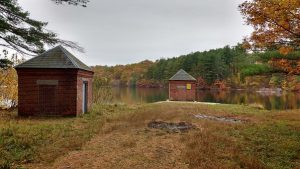By Dakota Antelman, Contributing Writer

(Photo/Dakota Antelman)
Hudson – The Hudson Department of Public Works (DPW) presented roughly $5.3 million in potential improvements to Hudson’s water system at a Board of Selectmen meeting Oct. 30. The projects would improve water quality and the reliability of service, but may also impact customer’s water bills.
The presentation included 10 projects that the DPW suggested the town prioritize. It will now be up to the selectmen to decide how to respond to those suggestions.
“The best way to approach this is financially, through capital, and really prioritize what we have within this group of projects,” said DPW Director Eric Ryder.
Among the suggestions, renovations to booster pump stations on Kent Drive and Ruth Ellen Road, the town’s Kane Well and the connection with Marlborough’s water system would all improve redundancy.
Other projects included the demolition of a currently unused gatehouse at the Gates Pond Reservoir, and the replacement of roughly 1,500 feet of water mains on Marlborough Street.
One of the largest projects on the list was a $1.3 million renovation of a 71-year-old water tank on Hudson’s Pope Hill off School Street. Last painted in 1990, Ryder said both the interior and the exterior of the tank need to be resurfaced, particularly after Hudson’s most recent sanitary survey identified the tank as a key issue. In addition to that, the town would need to repair a ladder climbing the side of the tank and install new electrical systems.
In addition to physical projects, Ryder suggested that the town improve a computer system, known as SCADA, used to operate the water system. He and Executive Assistant Tom Moses also agreed that the town should study the currently deactivated Rimkus Well to consider bringing it back into the water system.
Though the well was deactivated in the mid-1990s due to contaminants, the town still holds a permit to use it.
“It’s so hard and it takes so long to get a well permitted through [the Department of Environmental Protection] now, that it’s one of these things that you never want to give up,” Moses said.
The town hopes it could pay for some of the suggested projects using additional revenue generated after replacing 255 commercial water meters in town. Those meters are primarily between 25- and 20-years-old and, according to Ryder, are inaccurate.
New meters would better measure water usage. In response to a question from Selectman James Quinn, who owns property downtown, however, Ryder said tenants could “potentially” be surprised by their water bills after those meter replacements.
The DPW presentation included no timeframe for the projects, prompting a brief discussion near the end of the meeting over the next steps.
Though they did not come up with any specific timeframe, Moses and the selectmen agreed that the projects would need to be staggered to spread the financial burden on the town and the physical burden the construction would place on the water system.












